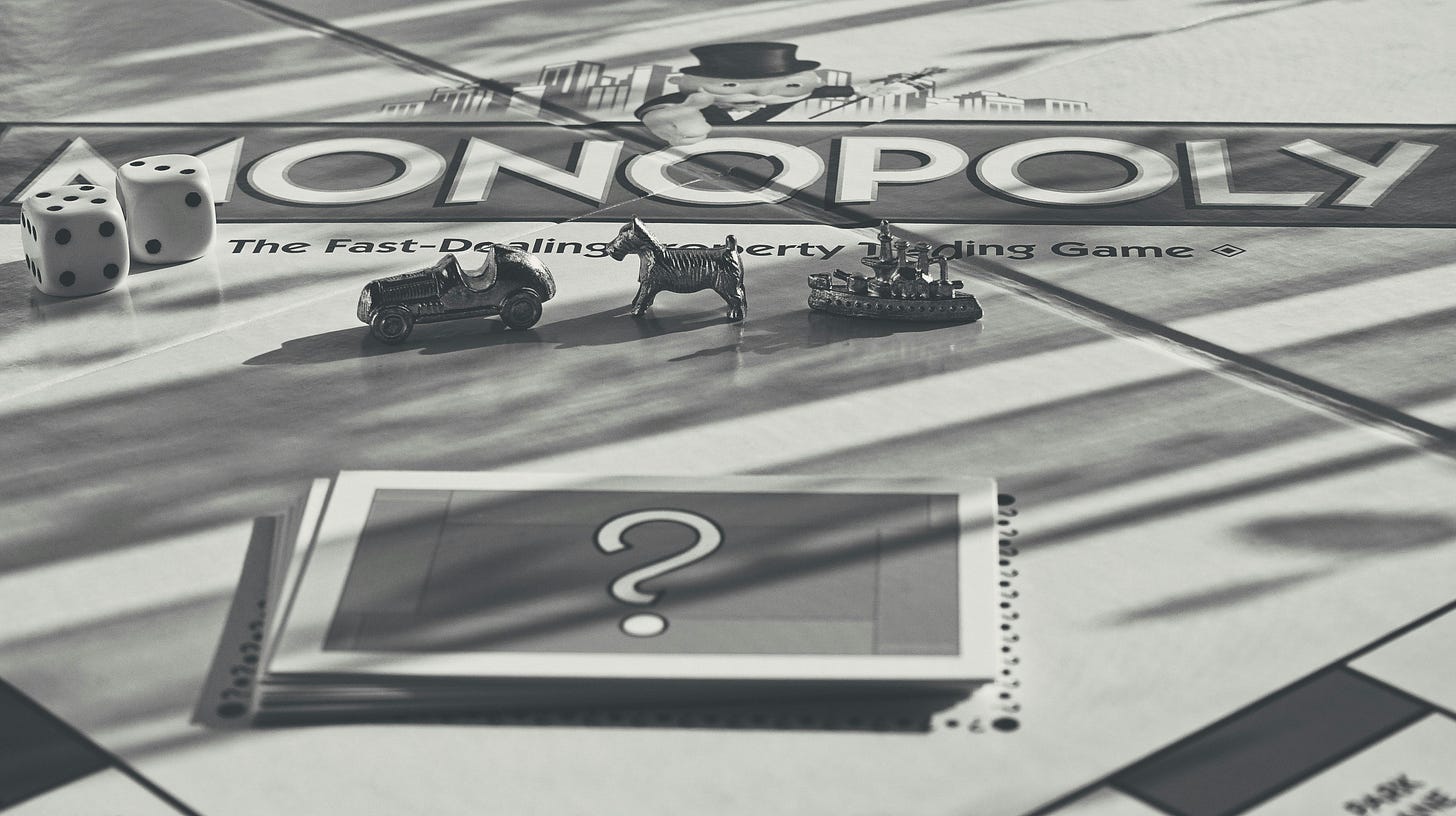Monopoly Stories
Competition forces one to innovate in order to survive, but when innovation turns into monopoly there is no longer a need to compete
«Competition is for losers» — Peter Thiel
Monopoly, from the Greek mònos «alone» and pólion «to sell», is a form of market in which a single seller offers a product or service for which there are no close substitutes, i.e., natural monopoly, or operates in a protected environment, by legal barriers, i.e., legal monopoly. In short, it consists of centralization of market supply of a given good or service in the hands of a single seller. The real competitive advantage is monopoly. If you are the founder of a company, if you have a business idea, you need to avoid competition as much as possible. The crowd out there wants to compete to the death instead of running away. Peter Thiel is one of Silicon Valley's most famous entrepreneurs, one of the first investors in Facebook (Meta, ed.), and he has produced enlightening analyses of when market reality is counter-intuitive. According to Thiel, value is created in the ratio of a simple formula:
Company creates X value and captures Y% of X
This means to create a successful enterprise you must create something of value and capture a significant fraction of that value created. Note how X and Y are independent variables. For example, if X is average in size, but Y is respectable in size, it is possible to build a high-value enterprise. If X is very large, but Y is infinitesimal, the firm will have no economic value despite the high value of what it has created.
«La competizione è per i perdenti» — Peter Thiel
Monopolio, dal greco mònos «solo» e pólion «vendere», è una forma di mercato nella quale un unico venditore offre un prodotto o un servizio per il quale non esistono sostituti stretti, ovvero il monopolio naturale, oppure opera in ambito protetto, da barriere giuridiche, ovvero il monopolio legale. Consiste insomma nell'accentramento dell'offerta del mercato di un dato bene o servizio nelle mani di un solo venditore. Va da sé che il vero vantaggio competitivo è il monopolio. Se siete i fondatori di un’azienda, se avete un’idea imprenditoriale, dovete evitare il più possibile la competizione. La folla lì fuori vuole competere fino all’ultimo sangue invece di fuggire. Peter Thiel è uno dei più famosi imprenditori della Silicon Valley, uno dei primi investitori in Facebook (Meta, ndr), ed ha prodotto analisi illuminanti per capire quando la realtà del mercato è contro-intuitiva. Secondo Thiel il valore viene creato nel rapporto di una semplice formula:
Impresa crea X valore e cattura Y% di X
Ciò significa che per creare un’impresa di successo bisogna creare qualcosa di valore e catturare una frazione significativa di quel valore creato. Da notare come X e Y sono variabili indipendenti. Ad esempio, se X è di dimensioni medie, ma Y è di dimensioni rispettabili, è possibile costruire un’impresa con un valore alto. Se X è molto grande, ma Y è infinitesimale, l’azienda non avrà valore economico nonostante l’alto valore di ciò che ha creato.
Understanding competition and monopoly
In 2012, with revenues of $195.6 billion, American Airlines would have seemed more attractive than Google, which had revenues of $50.2 billion. Many people would invest in a $200 billion industry rather than a $50 billion one. But here comes the problem: profit margin of American Airlines in 2012 was 0.2%, with airlines had gone out of business in previous decades being recapitalized. This reality was reflected in market capitalization, which, in total, amounted to 112.4 billion. On the other hand, Google's margins in 2012 were 21% and this was reflected, at time, in a capitalization of 393.8 billion.
Google was part of a smaller market, but it was capturing a larger value.
Google's competitive advantage is monopoly, and monopoly is always better. Capitalism is by definition «amassing capital» and is therefore antonymous to competition, because a world of perfect competition is a world where capital is distributed. A situation of perfect competition is easy to analyze as a mathematical model, is efficient and politically attractive. Monopoly is the most advantageous situation. It is not enough to assess a firm's competitive advantage, you must understand its positioning on the spectrum between competition and monopoly. Some firms are competitive, others are monopolies.
Key point — Technology companies such as Google, Facebook, Apple or Amazon don’t have high profit margins because have a competitive advantage. In fact, they don’t compete but operate in a monopoly or near-monopoly situation.
Google describes its market as more competitive than it is to hide a monopoly situation and not risk regulation. It almost completely controls the search engine market although it rarely describes itself as a «search engine», which would point to the fact they have a stronger monopoly in that field than Microsoft had in the 1990s. More often, Google identifies its market with either technology market or advertising market, thus giving the impression that controls only a small slice of the market, since advertising through search engine is a fraction of online advertising, which is only part of generic advertising in the United States, which is only part of overall advertising market. Thus, a business controls 66% of the market appears to control only 3.5% of it.
Comprendere competizione e monopolio
Nel 2012, con entrate di 195,6 miliardi di dollari, le linee aeree di American Airlines sarebbero parse più interessanti rispetto a Google, che aveva entrate di 50,2 miliardi. Molti investirebbero in un’industria da 200 miliardi piuttosto che in una da 50. Ma qui arriva il problema: il margine di profitto di American Airlines nel 2012 era dello 0,2%, con linee aeree che nei decenni precedenti erano fallite ed erano state ricapitalizzate. Questa realtà si rifletteva nella capitalizzazione di mercato che, complessivamente, ammontava a 112,4 miliardi. Dall’altra parte, i margini di Google nel 2012 erano del 21% e questo si rifletteva, all’epoca, in una capitalizzazione da 393,8 miliardi.
Google faceva parte di un mercato più piccolo, ma catturava un valore più grande.
Il vantaggio competitivo di Google è il monopolio ed il monopolio è sempre preferibile. Il capitalismo è per definizione «ammassamento di capitale» ed è quindi antonimo alla competizione, perché un mondo di competizione perfetta è un mondo dove il capitale viene distribuito. Una situazione di competizione perfetta è facile da analizzare come modello matematico, è efficiente e appetibile politicamente. Il monopolio è la situazione più vantaggiosa per l’azienda. Non basta valutare il vantaggio competitivo di un’azienda, bisogna comprenderne il posizionamento nello spettro tra competizione e monopolio. Alcune imprese sono competitive, altre sono monopoli.
Punto chiave — Aziende tecnologiche come Google, Facebook, Apple o Amazon non hanno margini di profitto alti perché hanno un vantaggio competitivo. Infatti non competono, operano in una situazione di monopolio o quasi monopolio.
Google descrive il proprio mercato come più competitivo di quello che è per nascondere una situazione di monopolio e non rischiare di subire regolamentazioni. Controlla quasi completamente il mercato dei motori di ricerca anche se raramente si descrive come un «motore di ricerca», che punterebbe l’attenzione sul fatto che in quel campo hanno un monopolio più forte di quanto Microsoft non avesse negli anni ’90. Più spesso, Google identifica il proprio mercato con quello tecnologico o quello pubblicitario, dando così l’impressione di controllare solo una piccola fetta del mercato, in quanto la pubblicità attraverso motore di ricerca è una frazione delle pubblicità online, che è solo parte della pubblicità generica negli Stati Uniti, che è solo parte del mercato pubblicitario globale. Così, un business che controlla il 66% del mercato appare controllarne solo il 3,5%.
When innovation becomes monopoly
Where does a firm stand on the line between monopoly and perfect competition? You might think that most of them are in the middle, and you would not be the first victims of a false perception. Firms are in a monopoly situation pretend this is not the case because they don’t want to be regulated. On the other hand, companies in strong competition, where it is very difficult to make a profit, lie to the contrary and describe their business as «unique and unrepeatable» in order to appear different and attract investment. Reality of each company is much more extreme either toward monopoly or competition than it appears. It is a distortion in the perception of reality due to how people lie to benefit themselves.
Lawsuit in which Google is accused of monopoly goes forward — Google's preeminence as an internet search engine is an illegal monopoly propped up by more than $20 billion spent each year by the tech giant to lock out competition, Justice Department lawyers argued at the closings of a high-stakes antitrust lawsuit. Google, on the other hand, maintains that its ubiquity flow from its excellence, and its ability to deliver results customers are looking for. «It would be an unprecedented decision to punish a company for winning on the merits», Google's lawyer, John Schmidtlein, said late Friday afternoon in summation of the company's closing arguments. Justice Department lawyer Ken Dintzer told the judge that «today must be the day» for him to step in an stop Google's monopolistic behavior, which he likened to the tactics used by Microsoft two decades ago that prompted a similar antitrust battle. The U.S. government, a coalition of states and Google all made their closing arguments Friday in the 10-week lawsuit ot U.S. District Judge Amit Mehta, who must now decide whether Google broker the law in maintaining a monopoly status as a search engine.
In the last three centuries there has been incredible technological development, from the steam engine, to the computer revolution, but few inventors and scientists have gotten rich. Why? Because X and Y are independent variables: inventions of great value to society (X) don’t necessarily reward their inventors (Y). In the history of science, usually Y equals 0%, because scientific discovery often gives the scientist no competitive advantage whatsoever. Companies built railroads in the early 1900s brought enormous value to society, but almost all of them went bankrupt because of too much competition.
The history of innovation teaches a business strategy leads to competitive advantage is critical to economic success. Mistake is to go headlong into competition thinking success is winning against the competition. We think of losers as those who are not good at competing, those who are slow and don’t have good grades in school, but this leads to the belief that more success equals being able to compete more, when the opposite is true. Competition forces innovation to survive, but when innovation turns into monopoly there is no longer a need to compete and capital accumulation is possible. Don’t necessarily try to go through the little door around which everyone is crowding, rather look around the corner for the wide gate that no one has noticed.

Quando l'innovazione si trasforma in monopolio
Dove si posiziona un’azienda sulla linea tra monopolio e competizione perfetta? Potreste pensare che la maggioranza delle imprese si trovino nel mezzo e non sareste le prime vittime di una falsa percezione. Le aziende che si trovano in una situazione di monopolio fingono che non sia così, perché non vogliono essere regolamentate. Dall’altra parte, le aziende in forte competizione, dov’è difficilissimo fare profitto, mentono al contrario e descrivono la loro attività come «unica e irripetibile» per apparire diversi e attrarre investimenti. La realtà di ogni azienda è molto più estrema o verso il monopolio o verso la competizione di quanto non sembri. È una distorsione nella percezione della realtà dovuta a come le persone mentono per avvantaggiarsi.
La causa legale in cui Google è accusata di monopolio va avanti — La preminenza di Google come motore di ricerca su Internet è un monopolio illegale sostenuto da oltre 20 miliardi di dollari spesi ogni anno dal gigante tecnologico per bloccare la concorrenza, hanno sostenuto gli avvocati del Dipartimento di Giustizia alla chiusura di una causa antitrust ad alto rischio. Google, invece, sostiene che la sua ubiquità deriva dalla sua eccellenza e dalla sua capacità di fornire i risultati che i clienti cercano. «Sarebbe una decisione senza precedenti punire un'azienda per aver vinto nel merito», ha dichiarato l'avvocato di Google, John Schmidtlein, riassumendo le argomentazioni conclusive dell'azienda. L'avvocato del Dipartimento di Giustizia Ken Dintzer ha detto al giudice che «oggi deve essere il giorno» in cui deve intervenire per fermare il comportamento monopolistico di Google, che ha paragonato alle tattiche utilizzate da Microsoft due decenni fa che hanno dato origine a una battaglia antitrust simile. Il governo degli Stati Uniti, una coalizione di Stati e Google hanno presentato venerdì le loro argomentazioni conclusive nella causa durata 10 settimane davanti al giudice distrettuale degli Stati Uniti Amit Mehta, che ora dovrà decidere se Google ha infranto la legge mantenendo lo status di monopolio come motore di ricerca.
Negli ultimi tre secoli c’è stato un incredibile sviluppo tecnologico, dal motore a vapore, alla rivoluzione del computer, ma pochi inventori e scienziati si sono arricchiti. Perché? Perché X e Y sono variabili indipendenti: invenzioni di grandissimo valore per la società (X) non ricompensano necessariamente i loro inventori (Y). Nella storia della scienza, solitamente Y è uguale a 0%, perché la scoperta scientifica spesso non dà allo scienziato vantaggio competitivo alcuno. Le aziende che nei primi del ‘900 costruirono le linee ferroviarie portarono un enorme valore alla società, ma quasi tutte andarono in bancarotta per eccessiva competizione.
La storia dell’innovazione insegna che una strategia aziendale che porta a un vantaggio competitivo è fondamentale per il successo economico. L’errore è entrare a testa bassa nella competizione pensando che il successo sia vincere contro la concorrenza. Pensiamo ai perdenti come a quelli che non sono bravi a competere, a quelli che sono lenti e non hanno buoni voti a scuola, ma questo porta a credere che maggior successo equivalga a saper competere di più, mentre è vero l’opposto. La competizione obbliga a innovare per sopravvivere, ma quando l’innovazione si trasforma in monopolio non c’è più la necessità di competere ed è possibile l’accumulo di capitale. Non cercate per forza di passare attraverso la porticina attorno a cui tutti si accalcano, piuttosto cercate dietro l’angolo l’ampio cancello di cui nessuno si è accorto.




In Italy, monopoly is a really big problem that people don't fully understand.
Competition is for losers is a great topic!